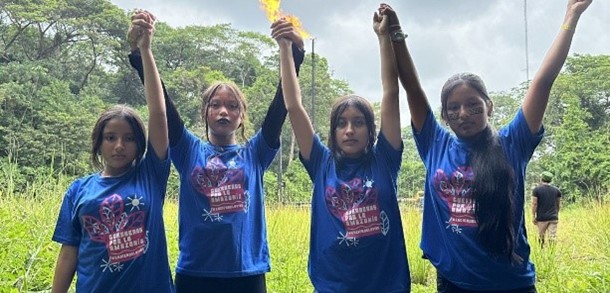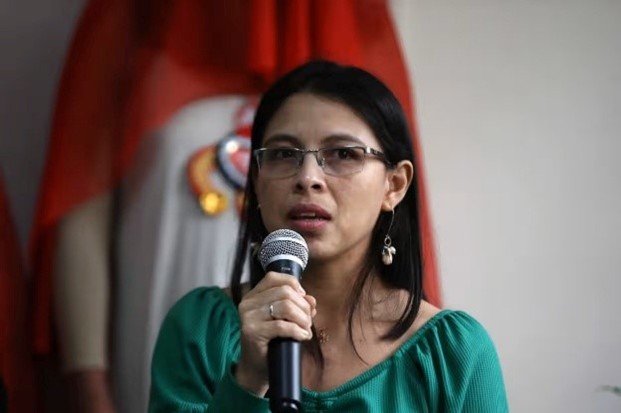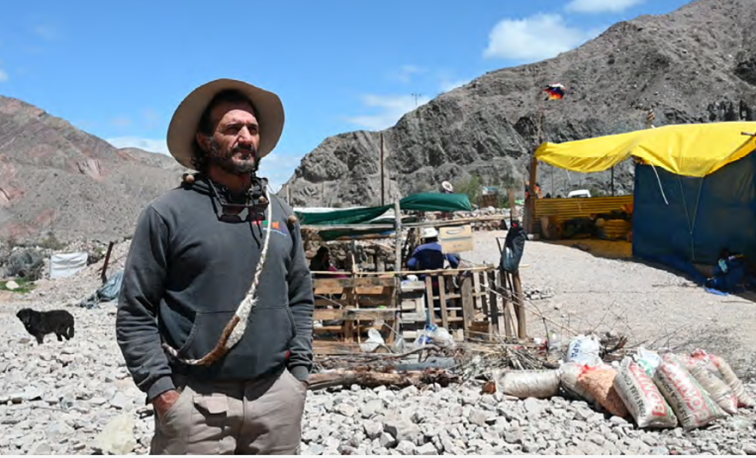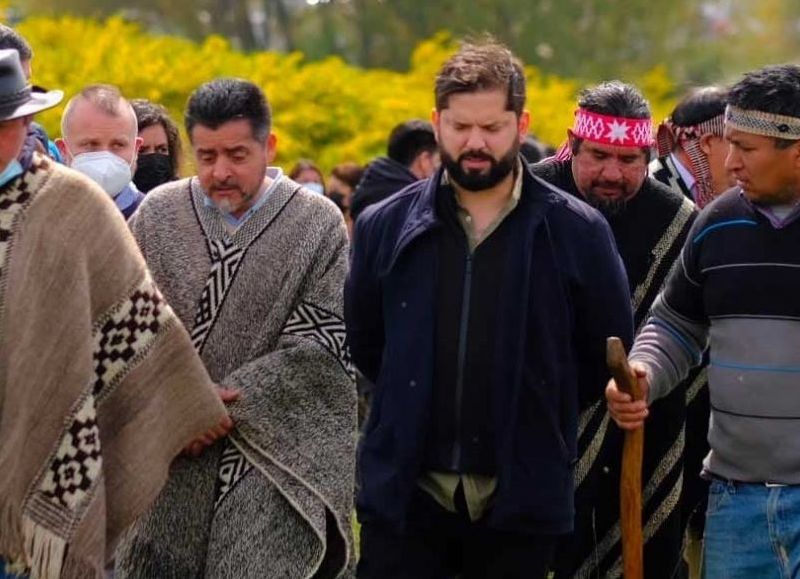This month we bring you news from Venezuela, Colombia, Argentina, Chile and Suriname
Highlights are:
- Amnesty has released its 2025 report on the State of the World’s Human Rights. The report assesses national, regional and global developments across a wide range of human rights themes, and documents human rights concerns during 2024 in 150 countries, including 10 South American countries
- Amnesty has published an article by the “Warriors for the Amazon”, the movement of young Ecuadorian women who are fighting the suffering and devastation wrought on the Amazon region by oil extraction.
- Amnesty has joined a multitude of other non-governmental organisations in calling on the Brazilian Government to use its position as host of COP30 to lead influence climate negotiations and establish best practice for future COP hosts
- The Inter-American Court for Human Rights (IACHR) is hearing the case of a forced sterilisation carried out in Peru in the 1990s.
- Amnesty International has just published a report Silence is not an option: repression and impunity in Jujuy. Two years after the constitutional debate and social protests in Jujuy, there have been almost no concrete steps toward accountability for the repression and criminalization that characterized the state response to the massive grassroots mobilization in 2023.
- President Boric announced a comprehensive plan to address the Mapuche conflict, based on recommendations from the Commission for Peace and Understanding.
- We have issued a new Urgent Action calling on the Venezuelan government to release all arbitrarily detained individuals, including Eduardo Torres, Javier Tarazona, Rocio San Miguel, Carlos Julio Rojas, and Kennedy Tejeda.
REGIONAL
 Amnesty has released its 2025 report on the State of the World’s Human Rights. The report assesses national, regional and global developments across a wide range of human rights themes, and documents human rights concerns during 2024 in 150 countries, including 10 South American countries, connecting global and regional issues and looking to the future. Individual country chapters can be found here.
Amnesty has released its 2025 report on the State of the World’s Human Rights. The report assesses national, regional and global developments across a wide range of human rights themes, and documents human rights concerns during 2024 in 150 countries, including 10 South American countries, connecting global and regional issues and looking to the future. Individual country chapters can be found here.
ECUADOR

Amnesty has published an article by the “Warriors for the Amazon”, the movement of young Ecuadorian women who are fighting the suffering and devastation wrought on the Amazon region by oil extraction. The movement has called on Ecuador’s recently re-elected President Noboa to acknowledge that he has a duty not only to govern, but also to protect life, health and nature.
BRAZIL

Amnesty has joined a multitude of other non-governmental organisations in calling on the Brazilian Government to use its position as host of COP30 to lead influence climate negotiations and establish best practice for future COP hosts and advance the participation of those who have long been at the forefront of the fight against climate change, including environmental and human rights defenders.
PERU

Marisiela Monzon Ramos, the daughter of Celia Cruz
The Inter-American Court for Human Rights (IACHR) is hearing the case of a forced sterilisation carried out in Peru in the 1990s. Demus, a Peruvian NGO for women’s rights, presented the case of Celia Ramos to the IACHR in 2010. Eleven years later, an IACHR report declared that the Peruvian state was responsible for the violation of Ramos’s rights and recommended the adoption of measures of reparation and non-repetition. However, as Peru made no progress in complying with the recommendations, the commission sent the case to the Inter-American court in June 2023. Celia Cruz died in 1997, 19 days after surgery for a tubal ligation caused respiratory failure. She was “harassed” into accepting the procedure, which was part of a nationwide family planning programme. While this is the first case of a forced sterilisation in Peru to reach the inter-American court, the Celia Ramos case is representative of thousands of others.
ARGENTINA

Santos Manfredi, llama breeder, badly injured by rubber bullets during the repression, who features in Amnesty’s report
Amnesty International has just published a report Silence is not an option: repression and impunity in Jujuy. Two years after the constitutional debate and social protests in Jujuy, there have been almost no concrete steps toward accountability for the repression and criminalization that characterized the state response to the massive grassroots mobilization in 2023. Amnesty’s investigation found that the provincial police used force in an illegitimate, arbitrary and excessive manner with the clear aim of dispersing the protests. At least 170 people were injured, at least ten of whom were hit in the face with a rubber bullet or tear gas canister. Three lost vision in one eye.
Amnesty International Argentina has just issued a report (Spanish) “It’s Also for You: Defending Access to Abortion in the Face of Public Policy Rollbacks,” This investigated the difficulties faced when trying to access legal abortion. The report highlights five main barriers: A lack of medical supplies; Lack of information regarding rights; Counsellors who spread misinformation and try to deter women; Unjustified delays; Mistreatment by health professionals. It also criticizes the government’s role in dismantling services and spreading fake news about abortion in order to “reinstate the stigma surrounding this right”
The Inter-American Commission on Human Rights (IACHR) released its 2024 Annual Report, warning of serious challenges and setbacks in the protection of human rights in Argentina. The IACHR warned that state reorganization policies have weakened the protection of rights and that government cuts and restructuring have hindered efforts to fight gender-based violence and discrimination. The report coincides with the government downgrading the Secretariat of Human Rights to an under-secretariat, implementing a 40% reduction in its structure and a 30% cut in staff.
The government has been criticized for scrapping 13 programmes that protected women, gender minorities and the families of femicide victims. These focused on gender equality, diversity training, provision of menstrual products, support for gender-based violence victims and the promotion of transgender individuals’ rights. Making the announcement, Justice Minister Mariano Cúneo Libarona labelled these programmes as “ideological” and a waste of money.
The Milei administration has tightened migration legislation via a decree which human rights organizations have said takes away foreigners’ rights in Argentina. The decree makes deportations easier, restricts migrants’ access to health and education, and adds more requirements for foreigners obtaining Argentine citizenship or permanent residency. The only ones who can now apply are those who have continued legal residence in Argentina for two years or those who prove “to have made a relevant investment in the country,” regardless of how long they lived there.
CHILE

President Boric presents initiatives to expedite land distribution, create an indigenous affairs body, and revive the economy in Mapuche regions.
President Boric announced a comprehensive plan to address the Mapuche conflict, based on recommendations from the Commission for Peace and Understanding. This includes expediting the distribution of lands and creating an indigenous affairs body. Chile’s Senate had just approved a 30-day extension (for the 56th time) of the constitutional state of emergency in some Mapuche provinces. Last year Amnesty Chile’s report (Spanish) on the Rights of Indigenous Peoples in Chile highlighted ongoing violations. It concluded urgent action is required to address the criminalization of Indigenous Peoples and to address systemic issues within the justice system.
The President was making his final annual address to Chile’s National Congress, ahead of Novembers elections (presidents cannot serve consecutive terms). He also announced the prison dedicated to housing inmates convicted of human rights abuses during the 1973-1990 military dictatorship will be converted to a normal penitentiary. The 100 former military dictatorship personnel who committed crimes against humanity and other rights violations have better conditions than those endured by the rest of Chile’s prison population. Boric concluded there was no justification for this privilege.
During the dictatorship thousands of babies are known to have been taken from their biological mothers and sold into adoption, mainly to foreign couples from the United States and Europe. The first ever prosecution has now been instigated, with the Santiago Court of Appeals ordering the preventive detention of five individuals accused of participating in a network of illegal adoptions. Judge Aguilar Brevis classified these acts as crimes against humanity, basing the criminal prosecution on the American Convention on Human Rights and the jurisprudence of the Inter-American Court of Human Rights.
Forensic experts from the Chilean Servicio Médico Legal (SML) have begun excavations at Cerro Chena, on the outskirts of Santiago. The site served as a military barracks during the dictatorship, and remains in operation today. The excavation is aimed at finding traces of some of the thousands who disappeared. Despite its history, Cerro Chena was not formally investigated until less than two years ago. Many believe this area was a clandestine burial ground, and relentless public pressure and legal actions have led to this in-depth probe of the site.
VENEZUELA
We have issued a new Urgent Action calling on the Venezuelan government to release all arbitrarily detained individuals, including Eduardo Torres, Javier Tarazona, Rocio San Miguel, Carlos Julio Rojas, and Kennedy Tejeda. After concealing Eduardo Torres’ fate and whereabouts since 9 May, high ranking Venezuelan authorities confirmed his detention on 13 May and disclosed he was being held at the infamous El Helicoide in Caracas. Javier Tarazona has been detained since 2 July 2021; Rocío San Miguel has been detained on 9 February 2024 and requires urgent surgery and rehabilitation; Carlos Julio Rojas has been detained since 15 April 2024; and Kennedy Tejeda was detained on 2 August 2024.
Almost 900 other politically motivated arbitrary detainees, including nationals from Spain, the US, Uruguay, Colombia, and Ukraine, amongst other nationalities, are currently being unfairly held in Venezuelan detention centres. This comes alongside smear campaigns and the criminalization of human rights organisations, such as PROVEA.
All the best,
South America Team – David Rogers (Argentina and Chile), James Baird (Venezuela) and Graham Minter (rest of South America,). And please don’t forget that you can follow us on our Facebook page and Twitter.
